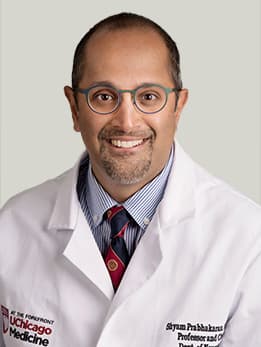Acute stroke patients are waiting hours for care

When it comes to stroke care, every minute matters.
A new study from the University of Chicago Medicine reveals that nearly 75 percent of acute stroke patients wait more than two hours to be transferred to a comprehensive stroke center — a delay in advanced care and treatments that risks long-term disability.
“In neurology, we often say that "time is brain." For every 15 minutes that pass without treatment, prior research shows there is a steady decrease in the chances of good outcomes for stroke patients,” said Shyam Prabhakaran, MD, MS, James Nelson and Anna Louise Raymond Professor and Chair of the Department of Neurology at UChicago and senior author on the study. "Getting to the right hospital quickly can be lifesaving."
Analyzing recent data from over 100,000 patients in 1,925 hospitals across the United States, the researchers found that the median time between initial arrival and departure for transfer, known as door-in-door-out (DIDO) time, was 174 minutes, with almost three in four patients waiting longer than the recommended maximum of 120 minutes. These intervals don’t even include the subsequent transport time between hospitals, meaning that it can be three hours or more before a patient receives critical interventions such as a thrombectomy to remove blood clots causing the stroke.
Furthermore, the data revealed that patients who were elderly, Hispanic, Black or female were more likely to have high DIDO times than their counterparts. Although many factors such as variations in disease presentation could contribute to these differences, Prabhakaran said the results should prompt greater focus on health equity when it comes to stroke care.
“Our findings expose disparities that shouldn't exist,” said Prabhakaran. “If you’re having a stroke, it doesn't matter if you're a man or a woman or black or white — you should be able to get the same care.” He urged healthcare providers and policymakers alike to be vigilant against and combat systemic biases that exist in healthcare.
However, Prabhakaran emphasized that DIDO times are too high across the board, and that healthcare systems and patients should work together to bring them down. Fortunately, the data uncovered multiple factors that lowered DIDO times. When emergency medical services (EMS) called ahead to notify medical centers that stroke patients were en route via ambulance, for example, median DIDO times were reduced by roughly 20 minutes.
“If you're a patient, one of the lessons from this is that calling 911 has immediate benefits, not only for stabilizing you but for the downstream effects that it carries,” said Prabhakaran.
To follow up on this research, Prabhakaran and his team are leading an NIH-funded study called the “Hospital Implementation of a Stroke Protocol for Emergency Evaluation and Disposition” study, a multi-center cluster randomized clinical trial to test interventions aimed at reducing DIDO times and improving functional outcomes in acute stroke patients requiring inter-hospital transfer. Such studies will identify best practices and determine the benefits of improving stroke systems of care in diverse geographic regions of the United States.
“We have to think about ways to help smaller hospitals redesign the clinical pathways they use to evaluate and consider patients for transfer, and then expedite the procedures to make those transfers faster,” said Prabhakaran.
The study, “Patient and Hospital-Level Factors Associated with Door-In-Door-Out Times for Inter-Hospital Transfer of Patients with Stroke” was published in JAMA in August 2023. Study co-authors include Mihai Giurcanu of UChicago, Brian Stamm and Regina Royan of the University of Michigan, Steven R. Messe of the University of Pennsylvania and Edward C. Jauch of Mountain Area Health Education Center.

Shyam Prabhakaran, MD, MS
Shyam Prabhakaran, MD, is the Chair of the Department of Neurology at UChicago Medicine. He is an internationally recognized leader in vascular neurology and stroke research and treatment, and has led projects focused on uncovering the underlying causes of recurrent strokes, improving stroke care, and optimizing patient outcomes and recovery.
See Dr. Prabhakaran's bio